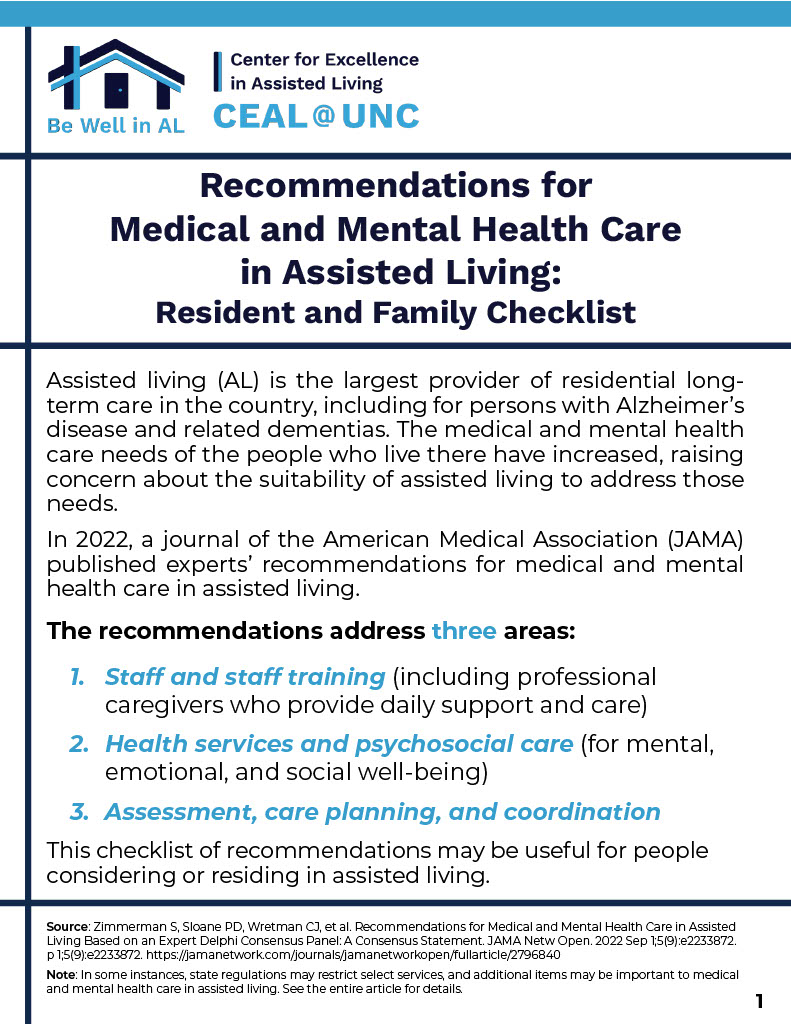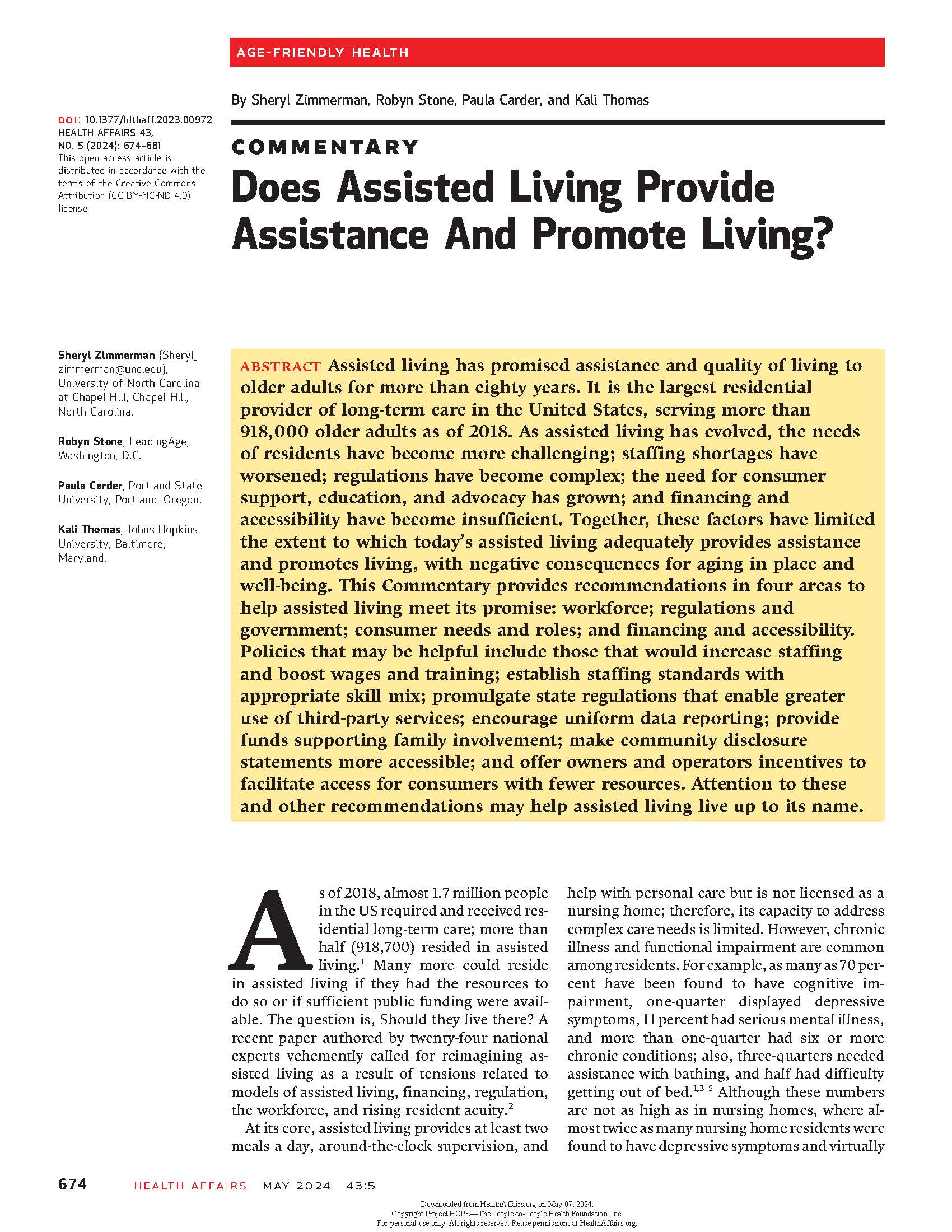The purpose of this study was to describe differences in treatment of White versus Black older adults, males versus females, and those living at home, assisted living, or nursing home communities with regard to the use of psychotropic, pain, and cardiovascular medications. Baseline data from the first 352 participants in the study, implementation of Function-Focused […]
Medication
Associations between Specialized Dementia Care, COVID-19 and Central Nervous System Medication Use in Assisted Living: A Population-Based Repeated Cross-Sectional Study
Associations between Specialized Dementia Care, COVID-19 and Central Nervous System Medication Use in Assisted Living: A Population-Based Repeated Cross-Sectional Study
Background Assisted living (AL) is an increasingly common residential setting for persons with dementia; yet concerns exist about sub-optimal care of this population in AL given its lower levels of staffing and services. Our objectives were to (i) examine associations between AL setting (dementia care vs. other), COVID-19 pandemic waves, and prevalent antipsychotic, antidepressant, anti-dementia, […]

Be Well in AL Recommendations: Resident/Family Checklist
Be Well in AL Recommendations: Resident/Family Checklist
CEAL@UNC recognizes the benefit of ongoing quality improvement in assisted living, including through the implementation of consensus medical and mental health care recommendations disseminated through the Be Well in AL Initiative. This checklist, to be used by residents and their families considering or residing in assisted living, is a helpful tool to understand recommended care […]
Prevalence and Correlates of Antipsychotic Medication Use in Oregon Assisted Living
Prevalence and Correlates of Antipsychotic Medication Use in Oregon Assisted Living
WHAT THIS MEANS FOR YOU: An analysis of data from 463 AL communities in Oregon from 2017-2019 revealed that on average, 30.7% of residents had received antipsychotics in the past 90 days. Nonprofit settings had lower usage compared to for-profit settings, while communities with more residents using Medicaid had higher rates of antipsychotic usage. Residents in memory care were more likely to receive these medications than residents in general AL settings.
Psychotropic, Anticonvulsant, and Opioid Use in Assisted Living Residents Before and During the COVID-19 Pandemic
Psychotropic, Anticonvulsant, and Opioid Use in Assisted Living Residents Before and During the COVID-19 Pandemic
WHAT THIS MEANS FOR YOU: Administrative data from 256 assisted living communities in Alberta during the COVID-19 pandemic found that during waves 2 to 4, antipsychotic use increased, (significantly more for dementia care residents), and that anticonvulsant use increased for assisted living (but not dementia care) residents. Additionally, there was an increase in antidepressant use and a decrease in benzodiazepine use for both assisted living and dementia care residents. The persistence of a pandemic-associated increase in these medications raises concerns about well-established health and wellbeing impacts for residents.
Paperwork, Paradox, and PRN: Psychotropic Medication Deficiencies in Assisted Living
Paperwork, Paradox, and PRN: Psychotropic Medication Deficiencies in Assisted Living
WHAT THIS MEANS FOR YOU: This study analyzed 170 psychotropic medication deficiency citations from 152 Oregon assisted living communities to determine discrepancies in state licensing and oversight of psychotropic medication use. It found most deficiencies involved documentation errors; there were unclear regulations for direct care workers who distribute medications; and there was a persistent disconnect about when to seek expertise before requesting psychotropic use.
Medication Costs and Use of Older Americans in Assisted Living Settings: A Nationally Representative Cross-Sectional Study
Medication Costs and Use of Older Americans in Assisted Living Settings: A Nationally Representative Cross-Sectional Study
WHAT THIS MEANS FOR YOU: Using data from 5,900 2015 National Health and Aging Trends Study participants aged 65 and above who had Medicare Part D prescription coverage, assisted living residents’ medication costs were twice as high as community-dwelling counterparts. Even though assisted living residents filled slightly fewer prescriptions than nursing home residents, they had similar rates of polypharmacy (10 or more prescriptions) and psychotropic medication prescriptions.
Psychotropic Medication Prescribing in Assisted Living and Nursing Home Residents with Dementia after the National Partnership
Psychotropic Medication Prescribing in Assisted Living and Nursing Home Residents with Dementia after the National Partnership
WHAT THIS MEANS FOR YOU: Using Medicare data for over 430,000 assisted living and long-stay nursing home residents, prescriptions for antipsychotic drugs decreased in both settings from 2010-2012 (before the National Partnership to Improve Dementia Care in Nursing Homes) to 2012-2017 (post-Partnership). However, assisted living prescribing decreased at a slower rate than nursing homes, meaning that the Partnership likely did not have a measurable impact in assisted living.
Staff Attitudes Related to Antipsychotic Prescribing in Assisted Living
Staff Attitudes Related to Antipsychotic Prescribing in Assisted Living
WHAT THIS MEANS FOR YOU: Data from over 13,500 residents from 247 assisted living communities indicated that healthcare supervisors who were more supportive of using medication to treat behaviors were more likely to have higher rates of antipsychotic prescribing in their communities. Health care supervisor attitudes may be leveraged to reduce antipsychotic prescribing.
Beyond the Medication Pass: Attitudes, Ethics, Agency, and Antipsychotic Medications in Assisted Living/Residential Care
Beyond the Medication Pass: Attitudes, Ethics, Agency, and Antipsychotic Medications in Assisted Living/Residential Care
WHAT THIS MEANS FOR YOU: This qualitative study based on 11 interviews with various professionals in Oregon, including direct care staff, nurses, administrators, and consultant pharmacists, found factors influencing antipsychotic prescribing decision-making: the rationale behind prescribing, moral viewpoints on psychotropic medications, and the challenge of balancing community and individual resident needs with external regulations.
Antibiotic Deescalation Opportunities for Residents in Assisted Living Facilities
Antibiotic Deescalation Opportunities for Residents in Assisted Living Facilities
WHAT THIS MEANS FOR YOU: During one-year in three assisted living communities, over 52% of the 106 residents were prescribed an antibiotic medication, similar to the rate of prescribing in nursing homes. Different from nursing homes, assisted living prescribers appeared less likely to reduce antibiotic use, and more likely to switch from narrow- to broad-spectrum antibiotics. Differences may be due to less frequent on-site visits of prescribing physicians in assisted living, which could lead to less familiarity with residents.
As-Needed Prescribing and Administration of Psychotropic Medications in Assisted Living: A 7-State Study
As-Needed Prescribing and Administration of Psychotropic Medications in Assisted Living: A 7-State Study
WHAT THIS MEANS FOR YOU: In 250 assisted living communities in 7 states, 10% of residents were prescribed psychotropic medications; less than 3% were administered a psychotropic medication in the previous week. Most (70%) prescriptions had a written reason for administration. Residents with both dementia and a psychiatric diagnosis were more likely to have a prescription, and communities that were larger or had a higher proportion of dementia care beds had a higher prescription rate.
Melatonin Prescribing in Assisted Living
Melatonin Prescribing in Assisted Living
WHAT THIS MEANS FOR YOU: The study investigated the use of melatonin among more than 5,700 residents from 250 assisted living communities across 7 states. Overall, 82% of communities prescribed melatonin to at least one resident, and on average, 9% of residents in a community received melatonin. Melatonin usage varied depending on community characteristics and was more likely if there was an RN or LPN on site or if the health care supervisor was more favorable to nonpharmacological practices.
Impact of Function-Focused Care on Psychotropic Medications and Opioid Use among Assisted Living Residents
Impact of Function-Focused Care on Psychotropic Medications and Opioid Use among Assisted Living Residents
WHAT THIS MEANS FOR YOU: This study evaluated the impact of function focused care (which trains staff to evaluate residents’ functional capacity and physical activity to optimize their participation in activities) on the use of psychotropic medications and opioids. The study observed 794 residents across 85 communities over 12 months. There was a reduction in opioid use in the treatment group after four months; in the full sample during the overall study period, there was an increase in the use of benzodiazepines and antipsychotics.
Monitoring Laboratory Parameters for Drug Toxicity in Assisted Living Facilities
Monitoring Laboratory Parameters for Drug Toxicity in Assisted Living Facilities
WHAT THIS MEANS FOR YOU: This quality improvement project focused on performing recommended laboratory tests per FDA medication labeling in a 58-bed assisted living community. Before the project, almost 60% of resident records had gaps in lab monitoring of medications, which was worsened because of COVID-19 restrictions. The project focused on close provider collaboration to ensure labs were conducted; after the project, almost 90% of residents received necessary lab tests for their medications.
Psychotropic and Pain Medication Use in Nursing Homes and Assisted Living Facilities during COVID-19
Psychotropic and Pain Medication Use in Nursing Homes and Assisted Living Facilities during COVID-19
WHAT THIS MEANS FOR YOU: This study focused on the potential impact of COVID-19 on the prescription of psychotropic and pain medication in nursing homes and assisted living. Nationally, there was relatively no change in the use of psychotropic and pain medications between pre- and post-COVID periods. However, there was increased use among individuals newly admitted during the pandemic, the cause of which was uncertain.
Potential Side Effects and Adverse Events of Antipsychotic Use for Residents With Dementia in Assisted Living: Implications for Prescribers, Staff, and Families
Potential Side Effects and Adverse Events of Antipsychotic Use for Residents With Dementia in Assisted Living: Implications for Prescribers, Staff, and Families
WHAT THIS MEANS FOR YOU: This study examined the use of antipsychotic medications among residents with dementia in 91 AL communities across seven states. The prevalence of potential side effects was high (93%) and of possible adverse events low, (6%), potentially associated with medication side effects. Quetiapine (Seroquel) and risperidone (Risperdal) were the most frequently prescribed antipsychotics. Most, but not all, residents’ family members were aware of their relative’s antipsychotic use.


